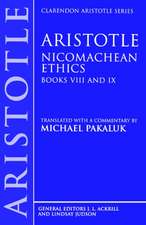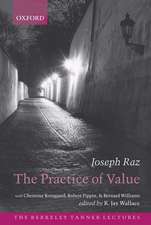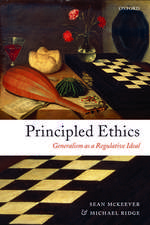Philosophical Criminology: New Horizons in Criminology
Autor Andrew Millieen Limba Engleză Paperback – 5 sep 2017
Philosophical criminology asks big questions about how we get on with one another and what happens when we do not. This accessible book in the New Horizons in Criminology series is the first to foreground this growing area. The book is structured around six philosophical ideas concerning our relations with others: values, morality, aesthetics, order, rules and respect. Building on the author’s theoretical and empirical research, the book considers the boundaries of criminology and the scope for greater exchange between criminology and philosophy. The book is illustrated using examples from a range of countries, and provides a platform for engaging with important topical issues using philosophical and theoretical insights.
| Toate formatele și edițiile | Preț | Express |
|---|---|---|
| Paperback (1) | 324.32 lei 6-8 săpt. | |
| Bristol University Press – 5 sep 2017 | 324.32 lei 6-8 săpt. | |
| Hardback (1) | 676.36 lei 6-8 săpt. | |
| Bristol University Press – 20 sep 2016 | 676.36 lei 6-8 săpt. |
Preț: 324.32 lei
Nou
Puncte Express: 486
Preț estimativ în valută:
62.06€ • 64.96$ • 51.65£
62.06€ • 64.96$ • 51.65£
Carte tipărită la comandă
Livrare economică 01-15 aprilie
Preluare comenzi: 021 569.72.76
Specificații
ISBN-13: 9781447323716
ISBN-10: 1447323718
Pagini: 168
Dimensiuni: 159 x 235 x 10 mm
Greutate: 0.26 kg
Editura: Bristol University Press
Colecția Policy Press
Seria New Horizons in Criminology
ISBN-10: 1447323718
Pagini: 168
Dimensiuni: 159 x 235 x 10 mm
Greutate: 0.26 kg
Editura: Bristol University Press
Colecția Policy Press
Seria New Horizons in Criminology
Notă biografică
Andrew Millie is professor of criminology and director of the Criminology Research Group at Edge Hill University, UK. He is coeditor of Anti-Social Behaviour Strategies: Finding a Balance and Securing Respect: Behavioural Expectations and Anti-Social Behaviour in the UK, both published by Policy Press.
Recenzii
“This book is the new primer for philosophical criminology. It borrows both knowledge and wisdom from the analytic and continental traditions, and it explains why criminology has always been (and must always be) a decidedly philosophical endeavor, sui generis.”
“Philosophical Criminology explores its topic from the most basic of premises: it is impossible to discuss criminology without philosophy.”
“This is an adventurous and exciting book looking at some old concepts but with fresh thinking. Philosophical Criminology asks big questions about how we get on with one another and what happens when we do not, taking a route which crosses disciplinary boundaries. Well-informed, hugely accessible, and memorable.”
“A real tour de force that lays the groundwork for what Millie calls an empathetic criminology, this little gem of a book deserves to be read very widely.”
“Opens the philosophical toolbox to criminology helping us to comprehend what questions need asking and how best to answer them.”






















